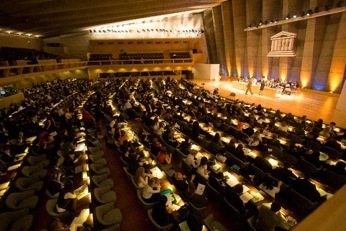About
The PAMUN Philosophy
PAMUN is designed to provide a joyful and meaningful experience of negotiation, compromise and consensus building, on issues of concern to the global community. Students are confronted with the challenge of defending and furthering the interests and goals of the countries they represent, while seeking to accept with due respect and consideration other countries’ goals and interests, and strike an appropriate balance.
While PAMUN offers students the opportunity to aquire knowledge and understanding the issues debated as well as the complex processes in an international body such as the United Nations, it is aimed first and foremost as an educational experience for the students, in which they are invited to develop two important human skills: listening for comprehension and not for controversy, and keeping an open mind. Our hope is that students participating in PAMUN will experience the thrill of debating and the joy of finding solutions, while experiencing first hand the power and the limitations of a multilateral organization like the United Nations, and that they will come away with a better grasp of its purpose and potential both today and in the future.

What is a MUN Conference?
Model United Nations is an authentic simulation of the United Nations General Assembly and its Committees, wich catapults students into the world of diplomacy and negociation. In Model UN, students step into the shoes of embassadors of UN member states, from Afganistan to Zimbabwe to debate the current issues on the organization’s vast agenda. The students, better known as delegates in Model UN, prepare positions and speeches, plot strategies, negotiate with supporters and adversaries, debate and seek to resolve conflicts, while navigating the UN complex “rules of procedure” – all in the interest of mobilizing “international cooperation” to resolve problems that affect almost every country on Earth.
Before playing out their delegate role in a Model UN conference, students do research on the particular global problems that will be addressed in their committees. The problems are drawn from today’s headlines, thus allowing students to become acquainted with how the international community acts on its concerns about peace and security, human rights, the environment, food and hunger, economic development, health, globalization, and more… Model UN delegates also look closely at the needs, aspirations, foreign policy of the country they will “represent” at the conference. The insights gained from exploring the history, geography, culture, economics and society of their assigned country contribute to the authenticity of the simulation, and ensure a lively and memorable experience.
The benefits of this learning experience are tremendous, as students are encouraged to develop skills that will be useful to them throughout their lives: researching and analyzing, writing, public speaking, problem solving, consensus building, conflict resolution, cooperation and compromise, leadership, et cetera.
Several websites can enlighten the newcomer to Model UN conferences:
UN Cyberbus – The official UN guide to Model UN
THIMUN – The Hague Model UN, main conference in Europe
UNA-USA – American United Nations Association
CANIMUN – Canadian International MUN, whose site is bilingual French/English